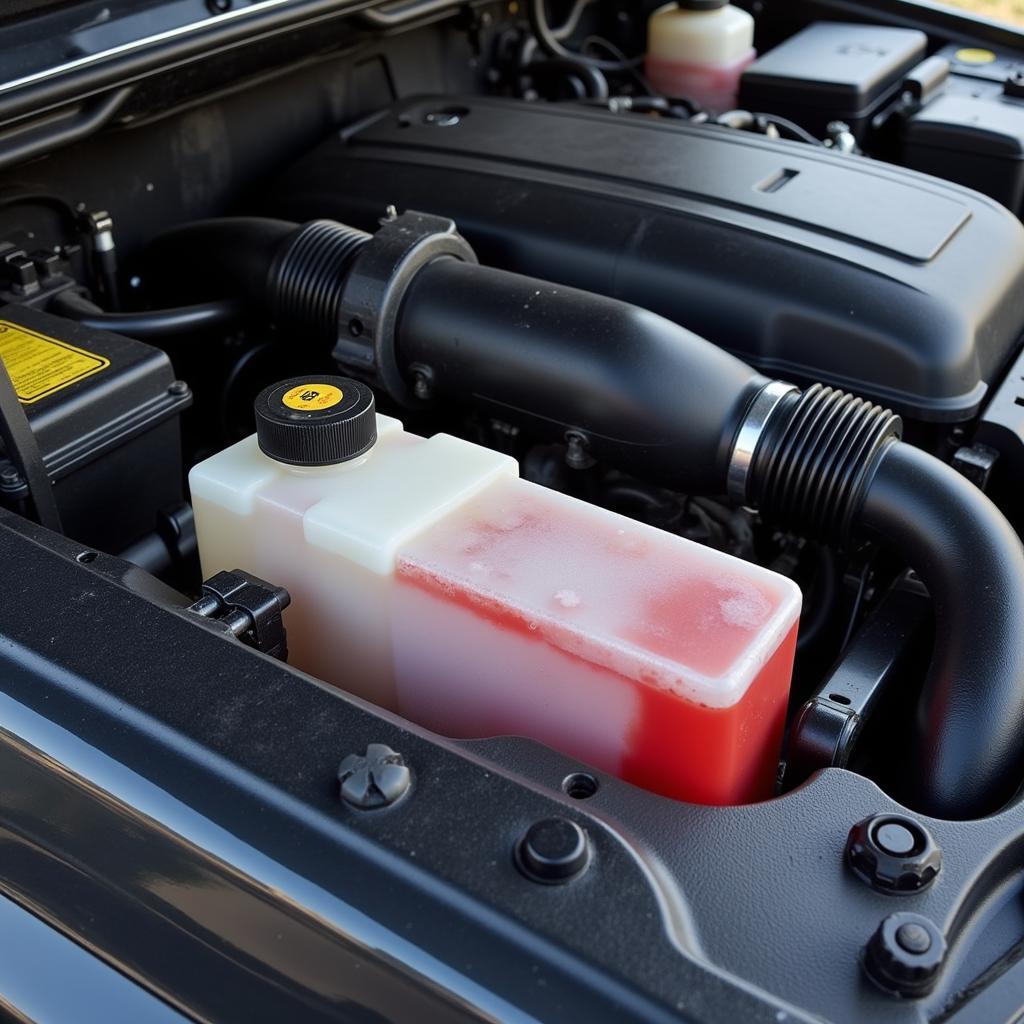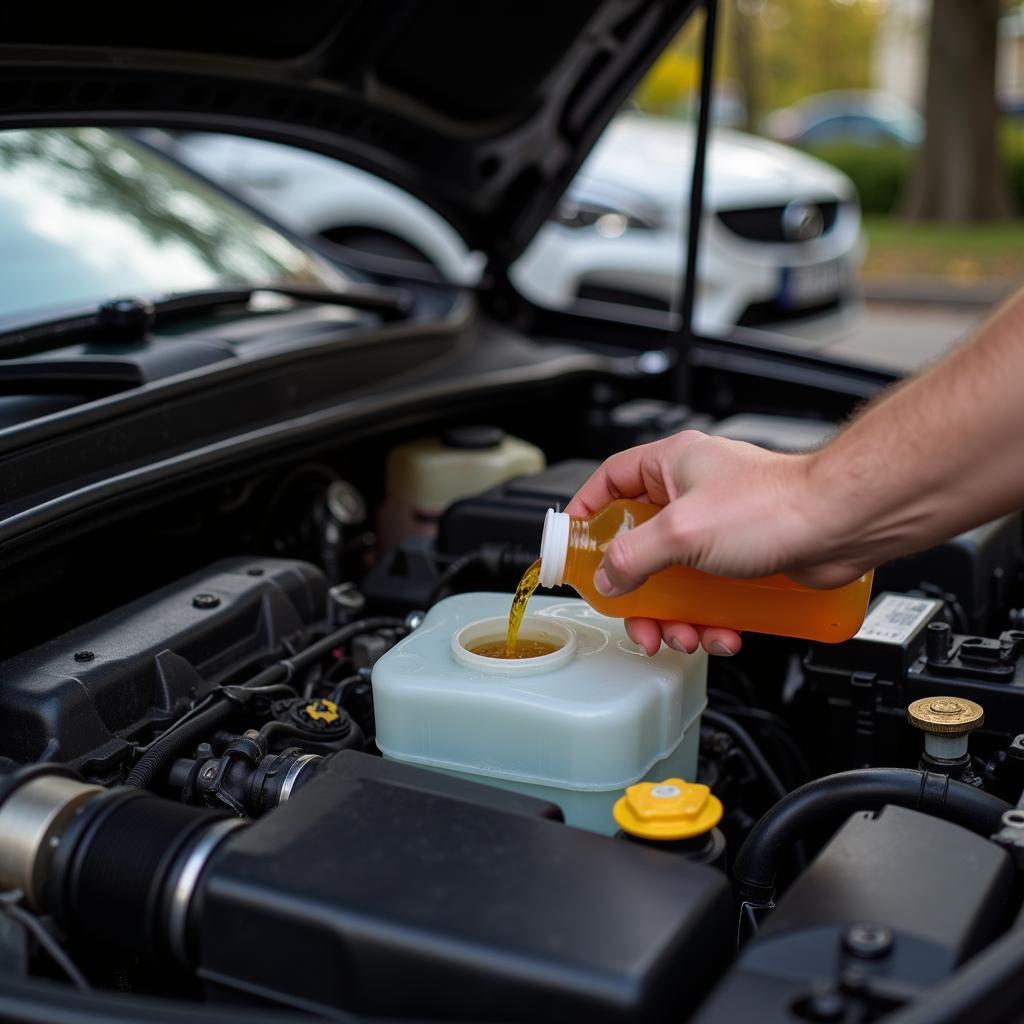Car overheating is a common problem that can cause significant damage to your engine if left unaddressed. Understanding the causes, symptoms, and solutions can save you from costly repairs and keep you safely on the road. This comprehensive guide will delve into everything you need to know about car overheating, equipping you with the knowledge to handle this frustrating situation.
What Causes a Car to Overheat?
Several factors can contribute to a car overheating. From low coolant levels to a malfunctioning thermostat, identifying the root cause is crucial for effective repair. Here are some common culprits:
- Low Coolant: Coolant, a mixture of antifreeze and water, circulates through the engine to absorb and dissipate heat. Low coolant levels, often due to leaks, can lead to overheating. Regularly check your coolant levels and address any leaks promptly.
- Faulty Thermostat: The thermostat regulates the flow of coolant through the engine. A stuck closed thermostat restricts coolant flow, causing the engine to overheat.
- Radiator Problems: The radiator disperses heat from the coolant. A clogged radiator, damaged radiator fan, or leaks can impair its ability to cool effectively.
- Water Pump Failure: The water pump circulates coolant throughout the cooling system. If the water pump fails, coolant circulation stops, leading to rapid overheating.
- Leaking Hoses and Belts: Hoses and belts play vital roles in the cooling system. Leaks or damage can disrupt coolant flow and cause overheating. what does a belt do for a car provides more detail on the function of belts.
- External Factors: Extreme ambient temperatures, particularly during hot summer months, can put extra stress on the cooling system and contribute to overheating.
 Car Overheating Due to Low Coolant
Car Overheating Due to Low Coolant
Recognizing the Signs of an Overheating Car
Knowing the signs of an overheating car is crucial for preventing severe engine damage. Here’s what to watch out for:
- Temperature Gauge Reading High: The most obvious sign is a temperature gauge needle moving into the red zone.
- Steam from Under the Hood: Steam or smoke billowing from under the hood is a clear indicator of overheating.
- Burning Smell: A sweet, burning smell can indicate overheating coolant or other fluids.
- Unusual Noises: Strange knocking or ticking sounds from the engine can signal overheating-related damage.
What To Do When Your Car Overheats
If your car overheats, pull over safely as soon as possible. Here are the steps you should take:
- Turn off the engine: Allow the engine to cool down.
- Do not open the hood immediately: Wait for at least 30 minutes to avoid burns from hot steam and coolant.
- Check the coolant level: Once the engine has cooled, carefully check the coolant level. If it’s low, add coolant (if you have some) or water.
- Call for roadside assistance: If the problem persists, call a mechanic or tow truck.
If your car shuts off while driving due to overheating, it can be a serious problem. Learn more about this issue in our article on car shuts off while driving.
“Regular maintenance, including checking coolant levels and inspecting hoses and belts, can prevent many overheating issues,” says John Smith, ASE Certified Master Technician.
 Adding Coolant to an Overheated Car
Adding Coolant to an Overheated Car
Preventing Car Overheating: Regular Maintenance is Key
Regular maintenance is the best defense against car overheating. Here are some essential tips:
- Regular Coolant Checks: Check your coolant level regularly and top it off as needed.
- Flush and Replace Coolant: Flush and replace your coolant according to your car’s manufacturer recommendations.
- Inspect Hoses and Belts: Look for cracks, leaks, or wear and tear on hoses and belts and replace them if necessary.
- Check the Thermostat: Ensure your thermostat is functioning correctly.
- Radiator Maintenance: Keep your radiator clean and free of debris. Have it professionally flushed periodically.
“Using a quality plug adapter for the car for diagnostic tools can help identify potential cooling system issues before they escalate into overheating,” adds Jane Doe, Automotive Diagnostics Specialist.
Conclusion
Car overheating can be a serious problem, but understanding its causes, symptoms, and solutions can help you prevent costly repairs and stay safe on the road. Regular maintenance and prompt attention to warning signs are crucial for keeping your car running smoothly. Remember to consult causes of car to overheat for a more detailed understanding of this critical issue. Regularly checking and maintaining your car chargers can also indirectly help prevent issues that could contribute to overheating by ensuring your battery is functioning optimally.
FAQ
- What is the most common cause of car overheating? Low coolant levels are often the primary culprit.
- Can I drive my car if it’s overheating? No, pull over immediately and turn off the engine.
- How often should I check my coolant level? At least once a month.
- How do I know if my thermostat is stuck? If your engine overheats quickly, it could be a sign of a stuck thermostat.
- What should I do if I see steam coming from under the hood? Pull over safely and turn off the engine.
Need help? Contact us via WhatsApp: +1(641)206-8880, Email: [email protected] or visit us at 276 Reock St, City of Orange, NJ 07050, United States. We have a 24/7 customer support team.


